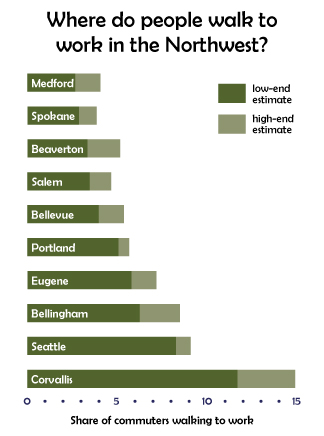I’ve been monkeying around with US Census data to develop this comparison of foot-powered commuting in the Northwest:

Corvallis cleans up. That’s not too surprising given its relative compactness, its large university, its moderate topography, and its overall awesomeness for getting around without a car. [Full disclosure: I have a huge crush on Corvallis.]
Other college towns, like Bellingham and Eugene, also do relatively well.
The other standout is Seattle.
With an estimated 8.7 percent of residents hoofing it to work, Seattle outshines every place in the Northwest that’s not named Corvallis. It beats the college towns and it does substantially better on walking than the region’s other big cities, including Portland (5.4 percent), Bellevue (4.7 percent), Spokane (3.4 percent), Tacoma (not shown, 3 percent), and Vancouver, Washington (not shown, 2.1 percent).
To be fair, this chart doesn’t include every city in the Northwest; it depicts only the most walking-friendly that also have roughly 50,000 or more workers. As it turns out, the places with the greatest share off commute-by-walking include none of the cities shown here, but many that are at or near military installations. Yet data for these and a few other locations that reported high rates of walking to work have very big margins of error and also represent relatively few workers, so I omitted them.

Comments are closed.